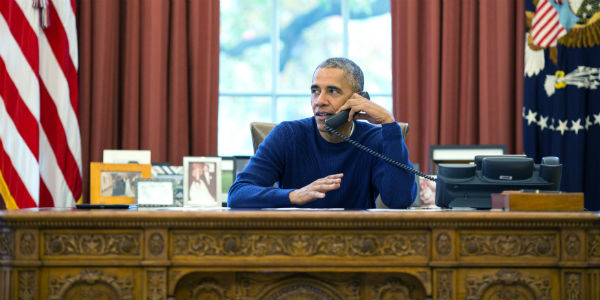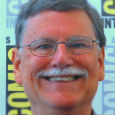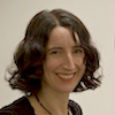What to read in the age of Trump
We need to think about democracy – now more than ever. As Donald Trump becomes the 45th President of the United States, Democratic Audit asked Brian Klaas, Russell Dalton, Cas Mudde and Meg Russell what texts they are turning to in order to understand and learn from the Trump phenomenon. This post is a work in progress – email democraticaudit@lse.ac.uk or post in the comments below if you’d like to add your own recommendation.

President Obama makes Thanksgiving Day phone calls from the Oval Office. Photo: Obama White House and US Government Works
 Brian Klaas, LSE Fellow in Comparative Politics and author of The Despot’s Accomplice: How the West is Aiding and Abetting the Decline of Democracy. Read an extract here.
Brian Klaas, LSE Fellow in Comparative Politics and author of The Despot’s Accomplice: How the West is Aiding and Abetting the Decline of Democracy. Read an extract here.
“I highly recommend Ian Goldin and Chris Kutarna’s book, The Age of Discovery (Bloomsbury, 2016). Their text makes the compelling comparison between today’s modern turmoil and the Renaissance in Europe. Their historical parallels are striking, but they also showcase how periods of enormous upheaval can often offer hidden rewards — along with the risks. While I find cold comfort in most events in today’s news, there is no question that we are in a period of drastic social and political change. The question, as Goldin and Kutarna suggest, is whether we can harness that change to our benefit or whether we will be subsumed and overwhelmed by it. By broadening the debate to a historical perspective, it is possible to see not only the upsides of risk, but also to realise that we are fortunate to be living in the most prosperous time in human history. Those lessons do not downplay the risks of populism, a Trump presidency, or an uncertain Brexit future, but they do suggest that there is still much reason to hope and be optimistic if we learn from history.”
 Cas Mudde is Associate Professor in the Department of International Affairs, University of Georgia. He is the author of The Populist Radical Right: A Reader. Read an extract here.
Cas Mudde is Associate Professor in the Department of International Affairs, University of Georgia. He is the author of The Populist Radical Right: A Reader. Read an extract here.
“I would like to nominate this short article [abstract free to read] by Kim-Lane Scheppele, professor at Princeton University, and one of the foremost scholars of illiberal democracy in Hungary. Her concept of the “Frankenstate”, i.e. a state in which all laws and institutions are by and large democratic, but the overall structure is not, is something to keep in mind for the coming four years.”
 Russell Dalton is Professor of Political Science at University of California Irvine
Russell Dalton is Professor of Political Science at University of California Irvine
“What are the lessons that academics, politicians, and citizens should take away from the 2016 US election? Beyond the inevitable discussions about Trump’s excesses, there is a deeper issue of those less-educated citizens who voted for change. Bob Putnam’s Our Kids: The American Dream in Crisis (New York: Simon and Schuster, 2015), is a powerful account of how the widening opportunity gap makes many working class Americans (and Europeans) losers in the race to modernity. This suggests a political lesson. In their efforts to increase their votes and enter government, many traditional leftist parties overlook these citizens to focus on the middle class and the more affluent voters. Our Kids illustrates the human costs of this narrow vision of progressive politics.”
 Meg Russell is Professor of British and Comparative Politics and Director of the Constitution Unit, UCL
Meg Russell is Professor of British and Comparative Politics and Director of the Constitution Unit, UCL
“One of the most worrying aspects of the current mood is that we seem gradually to be losing sight of the value of politics. The text which gets to the heart of what that term means, and provides a cogent analysis of why its practice is so important, and so deserving of nurture, is Bernard Crick’s 1962 classic In Defence of Politics. Crick notes that while ‘democracy’ is celebrated, ‘politics’ is frequently seen as grubby and undesirable – yet the one cannot function without the other. The essence of politics is a preparedness to listen to the other side, balance different evidence and interests, consider the conflicts and trade-offs, and reach the best possible compromise by peaceful negotiation.
“Crick’s skill was not just to articulate the essence of political rule, but to point out starkly its alternatives: non-peaceable resolution of conflict, tyranny or totalitarianism. In the Europe of 1962 those felt not far off. Today they are within few people’s living memory, and may appear distant threats. But the fact remains that if politics is dismissed and undermined, by demagogic leaders who peddle lies, besmirch their opponents, or fail to respect those with alternative points of view, or by media outlets who describe public servants navigating difficult issues as ‘enemies’, there is nowhere better to go. In a complex society, politics – in the Crickean sense – is our only hope for facilitating civilised collective decision-making. Once we’ve realised how precious it is, we have a duty to mobilise to defend it.”
This post represents the views of the authors and not those of Democratic Audit.





 Democratic Audit's core funding is provided by the Joseph Rowntree Charitable Trust. Additional funding is provided by the London School of Economics.
Democratic Audit's core funding is provided by the Joseph Rowntree Charitable Trust. Additional funding is provided by the London School of Economics.
Meg Russell suggests in defence of politics…”But the fact remains that if politics is dismissed and undermined, by demagogic leaders who peddle lies, besmirch their opponents, or fail to respect those with alternative points of view,or by media outlets who describe public servants navigating difficult issues as ‘enemies’… presumably she is talking about all the damage done to politics by those like Tony Blair over Iraq, or David Cameron, and the Remainer claque and their newspapers/state radio and tv who peddled falsehoods during the referendum campaign about catastrophe ‘in the first quarter guaranteed’ if the voter disobeyed the elite…or maybe she means Heath and those who took us into the EEC 40 years ago, knowing but never properly letting us know, that democracy and politics would suffer. And then later affecting that we knew what we were signing up to.
The trampling upon politics and public life has been done by the old elite over the past 50-60 years: you cannot now just say that parties and people struggling to try and re-assert the people’s rights over the elite and achieving some success are to be resisted as ‘demagogues’ just because they oppose the elite and shine a lot onto its rotten rigged systems.
Crick once said: ‘Since the business of politics is the conciliation of differing interests, justice must not merely be done, but to be seen to be done’. Well on that front alone, the political class for 25 years has failed abysmally – just ploughed its own furrow, become as one and told the voter to obey. It’s not enough to just smear and traduce opponents of the elite trying to break their hold on power.